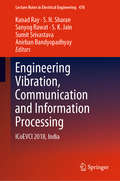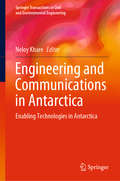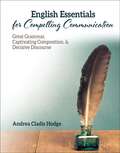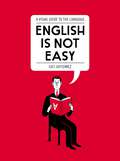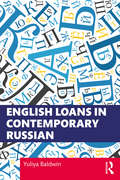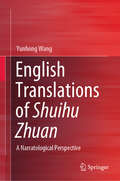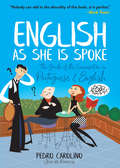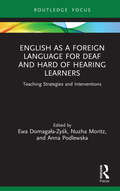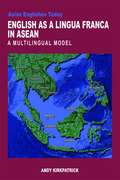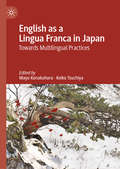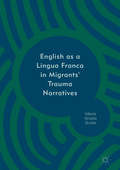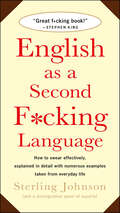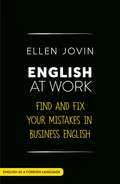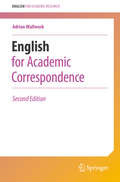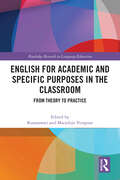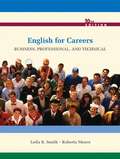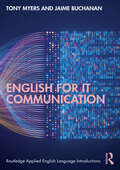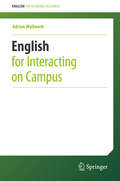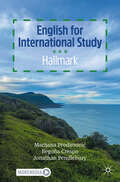- Table View
- List View
Engineering Vibration, Communication and Information Processing: Icoevci 2018, India (Lecture Notes In Electrical Engineering #478)
by S. K. Jain Kanad Ray Sanyog Rawat Anirban Bandyopadhyay Sumit Srivastava S. N. SharanThis book discusses the revolution of cycles and rhythms that is expected to take place in different branches of science and engineering in the 21st century, with a focus on communication and information processing. It presents high-quality papers in vibration sciences, rhythms and oscillations, neurosciences, mathematical sciences, and communication. It includes major topics in engineering and structural mechanics, computer sciences, biophysics and biomathematics, as well as other related fields. Offering valuable insights, it also inspires researchers to work in these fields. The papers included in this book were presented at the 1st International Conference on Engineering Vibration, Communication and Information Processing (ICoEVCI-2018), India.
Engineering and Communications in Antarctica: Enabling Technologies in Antarctica (Springer Transactions in Civil and Environmental Engineering)
by Neloy KhareIndia launched its maiden scientific expedition to Antarctica way back in 1981 and ever since annual expeditions are launched to address thematic research in the contemporary areas of Antarctic Science and Engineering. The initial efforts and achievements of India are not only significant but are of historical importance.This book discusses a wide array of topics that have entered the mainstream of geotechnical and geo environmental engineering over the initial two and half decades of India’s presence in the icy continent ‘Antarctica’. At the same time, it highlights the lessons learnt in cryo-engineering technologies. It covers various articles on many aspects of environmental science and collates the overall achievements in the fascinating field of Antarctic engineering and environmental impact assessment. Accordingly, this book covers articles on wind energy by Ramesh et al., and engineering aspects in Antarctica by Rai. Similarly, Pathak has reviewed the engineering details of Dakshin Gangotri and Maitri. On the contrary, Sharma has provided an interesting history about the process of establishment of Dakshin Gangotri station. Similarly, communication aspects have been highlighted by Dhaka. Commercial polymers and their utility in cold region have been discussed by Dabholker et al. Besides, Tiwari and Khare have reviewed the environmental studies carried out during the initial 25 years in Antarctic research base ‘Maitri’. Similarly, Ramchandran and Sathe have studied the natural radioactivity in Antarctica while fire safety in Antarctica has been touched upon by Chatterjee. On the other hand, Veerbhadraiah and Jain have provided a status on environmental management services at Maitri station Additionally Tiwari has provided details on the new Indian Research Base ‘Bharti’ at Larsemann Hills region. It provides a one-stop reference for researchers and those working in industry and government.
English Classics in Audiovisual Translation (Routledge Research in Audiovisual Translation)
by Irene Ranzato Luca VallerianiThis collection explores the translation of dialogue from the adaptations of literary classics across audiovisual media, engaging with the question of what makes a classic through an audiovisual translation lens. The volume seeks to fill a gap on the translation of classic texts in AVT research which has tended to focus on contemporary media.The book features well-known British literary texts but places a special emphasis on adaptations of the works of Jane Austen and William Shakespeare, figures whose afterlives have mirrored each other in the proliferation of film and television adaptations of their work. Chapters analyze myriad modes of AVT, including dubbing, subtitling, SDH, and voice-over, to demonstrate the unique ways in which these modes come together in adaptations of classics and raise questions about censorship, language ideologies, cultural references, translation strategies, humor, and language variation. In focusing on translations across geographic contexts, the book offers a richer picture of the linguistic, cultural, and ideological implications of translating literary classics for the screen and the enduring legacy of these works on a global scale.This book will be of interest to scholars in audiovisual translation, literary translation, comparative literature, film and television studies, and media studies.
English Essentials for Compelling Communication: Great Grammar, Captivating Composition, & Decisive Discourse
by Andrea Cladis HodgeThis book was written for entry-level college freshman needing a comprehensive review of how to both use and understand the English language while gaining sufficient written and oral skills needed to excel in all other college courses. As a foundational learning tool, students can use this book to practice grammar, grow their lexicon, improve their reading levels, and work toward overall mastery of the English language. The content of the instruction in this book employs a scaffolding format so it works best to use this book in the order in which it is written. However, if more focused topical learning is desired, please use the table of contents to direct your selected usage of this book.
English Is Not Easy: A Visual Guide to the Language
by Luci GutiérrezA cheeky, sophisticated, and strikingly illustrated guide that leaves generic English reference books in the dust When prominent Barcelona-based illustrator Luci Gutiérrez found herself tuning out in English class, she used her love of drawing to help retain what she’d learned. Ditching the kind of bland and useless phrases that fill most English textbooks, Gutiérrez uses whimsical characters, cheeky dialogue, and even insults to bring vocabulary, grammar, and usage topics to life. Nearly forty-seven million people in the United States speak a language other than English at home, and even most native speakers struggle with subtle distinctions, such as when to use “whether” as opposed to “if.” (For example: I wonder whether I should have added a little more poison to his tea.) Already published to wide acclaim abroad, English Is Not Easy is sure to delight grammar mavens and students of English in America.
English Loans in Contemporary Russian
by Yuliya BaldwinEnglish Loans in Contemporary Russian presents over 2,000 English borrowings in the Russian lexicon, providing a unique account of changes in the language and culture. The entries in this practical Russian-English dictionary cover a wide range of well-established loanwords to more recent neologisms. They address an increasingly relevant part of the contemporary Russian lexicon, particularly in the language of business, politics, mass media, computer, medicine, and other professional areas. The dictionary reflects how the language is responding to new patterns of life and will be of interest to Russian language learners and linguists.
English Translations of Korczak’s Children’s Fiction: A Linguistic Perspective (Palgrave Studies in Translating and Interpreting)
by Michał BorodoThis book investigates major linguistic transformations in the translation of children’s literature, focusing on the English-language translations of Janusz Korczak, a Polish-Jewish children’s writer known for his innovative pedagogical methods as the head of a Warsaw orphanage for Jewish children in pre-war Poland. The author outlines fourteen tendencies in translated children’s literature, including mitigation, simplification, stylization, hyperbolization, cultural assimilation and fairytalization, in order to analyse various translations of King Matt the First, Big Business Billy and Kaytek the Wizard. The author then addresses the translators’ treatment of racial issues based on the socio-cultural context. The book will be of use to students and researchers in the field of translation studies, and researchers interested in children’s literature or Janusz Korczak.
English Translations of Shuihu Zhuan: A Narratological Perspective
by Yunhong WangThis book offers a novel perspective on the intersection of translation and narration in literary translation by investigating how three translations of Shuihu Zhuan present the original narrative mode to the target readership in terms of four narrative elements—voice, commentary, point of view and motif—in different periods of history. It not only validates but also quantifies the differences in strategy-making patterns between translators, as well as between different narratological categories. The established theoretical frameworks (including a narrative-descriptive model and a sociological explanatory framework) and the data collected may provide methodological and empirical support for further studies on shifts of narrative features in translation. The tendencies manifested by different translators and identified by the study may also shed new light on the teaching and learning of translation skills.The book offers a valuable reference guide for scholars, practitioners, translators and graduate students in the fields of e.g. language, translation, literature and cultural studies, and for anyone with an interest in Chinese classical literature, Chinese-English translation, narrative studies or cross-cultural studies.
English as She Is Spoke: The Guide of the Conversation in Portuguese and English
by Mark Twain Pedro CarolinoThe Guide of the Conversation in Portuguese and English
English as a Foreign Language for Deaf and Hard of Hearing Learners: Teaching Strategies and Interventions (Routledge Research in Special Educational Needs)
by Ewa Domagała-Zyśk; Nuzha Moritz; Anna PodlewskaThis book outlines best practice and effective strategies for teaching English as a foreign language to D/deaf and hard of hearing (DHH) students. Written by a group of researchers and experienced practitioners, the book presents a combination of theory, hands-on experience, and insight from DHH students. The book brings together a variety of tried and tested teaching ideas primarily designed to be used for classroom work as a basis for standby lessons or to supplement courses. Placing considerable emphasis on practical strategies, it provides educators and practitioners with stimulating ideas that facilitate the emergence of fluency and communication skills. The chapters cover a wide range of interventions and strategies including early education teaching strategies, using sign -bilingualism in the classroom, enhancing oral communication, speech visualization, improving pronunciation, using films and cartoons, lip reading techniques, written support, and harnessing writing as a memory strategy. Full of practical guidance grounded in theory, the book will be a useful resource for English teachers and all those involved in the education of deaf and hard of hearing learners across the world; including researchers, student teachers, newly qualified teachers, school supervisors, and counsellors.
English as a Lingua Franca in ASEAN
by Andy KirkpatrickThe lingua franca role of English, coupled with its status as the official langu
English as a Lingua Franca in Japan: Towards Multilingual Practices
by Keiko Tsuchiya Mayu KonakaharaThis edited book examines the phenomenon of English as a Lingua Franca (ELF) in the Japanese context, using multilingualism as a lens through which to explore language practices and attitudes in what is traditionally viewed as a monolingual, monocultural setting. The authors cover a broad spectrum of topics within this theme, including language education policies, the nature of ELF communication in both academic and business settings, users’ and learners’ perceptions of ELF, and the pedagogy to foster ELF-oriented attitudes. Teaching and learning practices are reconsidered from ELF and multilingual perspectives, shifting the focus from the conformity to native-speaker norms to ELF users’ creative use of multilingual resources. This book is a key resource for advancing ELF study and research in Japan, and it will also be of interest to students and scholars studying multilingualism and World Englishes in other global contexts.
English as a Lingua Franca in Migrants' Trauma Narratives
by Maria Grazia GuidoThis book examines how trauma is experienced and narrated differently across languages and cultures, drawing on rich ethnographic case studies and a novel cognitive-linguistic approach to analyse the variations of English as a Lingua Franca (ELF) used in the narratives of West-African migrants and refugees in the course of intercultural encounters with Italian experts from domain-specific fields of discourse (including legal, medical, religious and cultural professionals). It examines the ways in which such experts interpret the migrants’ trauma narratives by applying discourse conventions from within their communities of practice, as well as their own native linguacultural norms. It argues persuasively for the development of a ‘hybrid ELF mode’ of intercultural communication to be used by experts in charge of unequal encounters in specialized migration contexts that can accommodate different culture-bound categorizations of trauma. This timely and important work will appeal in particular to students and scholars of applied linguistics, discourse analysis, cognitive linguistics, intercultural communication, pragmalinguistics, migration studies and healthcare communication.
English as a Second F*cking Language: How to Swear Effectively, Explained in Detail with Numerous Examples Taken from Everyday Life
by Sterling JohnsonIn the English language, swearing is essential to effective communication. In this hilarious and illuminating guide, you will learn just how to do it - no f*cking problem. Whether you want to succeed in business, school, or social circles, a strong command of vocabulary is absolutely necessary. Just imagine a stranger to our shores, trying to comprehend the following conversation: John: Mary, would you like to attend the opera this evening?Mary: F*cking-A. should I wear my black dress?John: Why the f*ck not?Mary: F*cked if I know-Oh, f*ck! I just remembered. It got f*cked up in the wash.John: Well, f*ck the opera. Let's stay home and f*ck.Mary: Good f*cking idea.English as a Second F*cking Language (ESF*L) is the perfect way for nonnative speakers to learn the basics of swearing. At the same time, it also offers native speakers a wide variety of twists and new refinements. Page after page, ESF*L provides a smorgasbord of swearing synonyms designed to boost your vocabulary-everything from the conventional d*mn and sh*t to a host of more inventive terms that would make any truck driver blush. And when you're finished reading, our Final F*cking Exam is the perfect test of your swearing skills. You'll be surprised by how much you've learned!“Great f*cking book!” —Stephen King
English as an International Language
by Farzad SharifianThe rapid global spread of the English language has serious linguistic, ideological, socio-cultural, political, and pedagogical implications as it creates both positive interactions and negative tensions between global and local forces. Accordingly, debate about issues such as the native/non-native divide, the politics of an international language, communication in a Lingua Franca, the choice of a model for ELT, and the link between English and identity(ies) has stimulated scholarly inquiry in an unprecedented way. The chapters in this volume revisit, challenge, and expand upon established arguments and positions regarding the politics, policies, pedagogies, and practices of English as an international language, as well as its sociolinguistic and socio-psychological complexities.
English at Work: Find and Fix your Mistakes in Business English as a Foreign Language
by Ellen JovinThis Grammar Guru will solve the world's problems. Or, at least, help you figure out when to use an Oxford comma. The New York TimesPut your English skills to work for you! This book is ideal for intermediate and advanced (CEFR B1-C1) nonnative speakers of English seeking to increase their communication confidence and effectiveness in the workplace. Improve your precision and professionalism so your ideas shine!The book consists of 50 short quizzes which include the most common English errors made by nonnative speakers in professional environments. This fun format allows you to find your own frequent errors and fix them. You will test your skills quickly, daily, and build your language awareness and accuracy in writing and speaking English. Short, clear explanations after each quiz help you improve your knowledge of the grammar rules. Complementing the quizzes are Ellen says boxes with the same practical advice on good communication etiquette and habits that Ellen has been sharing for years with large corporate clients in New York City and beyond. Witty and humorous drawings illustrate confusing language and common misunderstandings. The focus of the exercises is on fixing your grammar and problems with word choice. Examples are pulled from every industry: finance, law, consulting, publishing, real-estate, retail, technology, energy, pharmaceutical, manufacturing, education, advertising, government, insurance, non-profit, and more. Whatever your profession or interest, you will benefit from the exercises contained in this book. If you are just looking to sharpen your English, this book is for you, too.You will be learning from a professional writer with two decades of experience teaching executives in a business setting. A language-learner herself who has studied some two dozen languages, Ellen Jovin has written this book to help motivated working adults advance their business English on their own time and at their own pace.Note that this book reflects global English usage, but spelling is American English.
English at Work: Find and Fix your Mistakes in Business English as a Foreign Language
by Ellen JovinThis Grammar Guru will solve the world's problems. Or, at least, help you figure out when to use an Oxford comma. - The New York TimesPut your English skills to work for you! This book is ideal for intermediate and advanced (CEFR B1-C1) nonnative speakers of English seeking to increase their communication confidence and effectiveness in the workplace. Improve your precision and professionalism so your ideas shine!The book consists of 50 short quizzes which include the most common English errors made by nonnative speakers in professional environments. This fun format allows you to find your own frequent errors and fix them. You will test your skills quickly, daily, and build your language awareness and accuracy in writing and speaking English. Short, clear explanations after each quiz help you improve your knowledge of the grammar rules. Complementing the quizzes are Ellen says boxes with the same practical advice on good communication etiquette and habits that Ellen has been sharing for years with large corporate clients in New York City and beyond. Witty and humorous drawings illustrate confusing language and common misunderstandings. The focus of the exercises is on fixing your grammar and word-choice problems. Examples are pulled from every industry: finance, law, consulting, publishing, real-estate, retail, technology, energy, pharmaceutical, manufacturing, education, advertising, government, insurance, non-profit, and more. Whatever your profession or interest, you will benefit from the exercises contained in this book. If you are just looking to sharpen your English, this book is for you, too.This India-specific edition includes a special section of the most common English errors made in the Indian workplace and their standard equivalents, as well as a downloadable reference guide of frequently confused and misused words and expressions.You will be learning from a professional writer with two decades of experience teaching executives in a business setting. A language-learner herself who has studied some two dozen languages, Ellen Jovin has written this book to help motivated working adults advance their business English on their own time and at their own pace.
English at Work: Find and Fix your Mistakes in Business English as a Foreign Language
by Ellen JovinThis Grammar Guru will solve the world's problems. Or, at least, help you figure out when to use an Oxford comma. The New York TimesPut your English skills to work for you! This book is ideal for intermediate and advanced (CEFR B1-C1) nonnative speakers of English seeking to increase their communication confidence and effectiveness in the workplace. Improve your precision and professionalism so your ideas shine!The book consists of 50 short quizzes which include the most common English errors made by nonnative speakers in professional environments. This fun format allows you to find your own frequent errors and fix them. You will test your skills quickly, daily, and build your language awareness and accuracy in writing and speaking English. Short, clear explanations after each quiz help you improve your knowledge of the grammar rules. Complementing the quizzes are Ellen says boxes with the same practical advice on good communication etiquette and habits that Ellen has been sharing for years with large corporate clients in New York City and beyond. Witty and humorous drawings illustrate confusing language and common misunderstandings. The focus of the exercises is on fixing your grammar and problems with word choice. Examples are pulled from every industry: finance, law, consulting, publishing, real-estate, retail, technology, energy, pharmaceutical, manufacturing, education, advertising, government, insurance, non-profit, and more. Whatever your profession or interest, you will benefit from the exercises contained in this book. If you are just looking to sharpen your English, this book is for you, too.You will be learning from a professional writer with two decades of experience teaching executives in a business setting. A language-learner herself who has studied some two dozen languages, Ellen Jovin has written this book to help motivated working adults advance their business English on their own time and at their own pace.Note that this book reflects global English usage, but spelling is American English.
English for Academic Correspondence
by Adrian WallworkWritten specifically for researchers of all disciplines whose first language is not English, this guide presents easy-to-follow rules and tips, along with authentic examples taken from real emails, referees' reports and cover letters, will show you how to: write effective emails (subject lines, structure, requests, level of formality) review other people's manuscripts reply effectively and constructively to referees' reports correspond with editors write letters regarding summer schools, internships, and PhD and postdoc programs write reference letters This new edition contains over 40% new material, including stimulating factoids and discussion points both for self-study and in-class use, as well as suggestions for drafting proposals for research projects and writing research statements. EAP teachers will find this book to be a great source of tips for training students, and for providing both instructive and entertaining lessons. Other books in the series cover: writing research papers; presentations at international conferences; English grammar, usage and sty≤ and interacting on campus; plus exercise books and a teacher's guide to the whole series. Please visit http://www. springer. com/series/13913 for a full list of titles in the series. Adrian Wallwork is the author of more than 30 ELT and EAP textbooks. He has trained several thousand PhD students and academics from 35 countries to write research papers, prepare presentations, and communicate with editors, referees and fellow researchers.
English for Academic Research: Writing Exercises
by Adrian WallworkThis book is based on a study of referees' reports and letters from journal editors on reasons why papers written by non-native researchers are rejected due to problems with English (long sentences, redundancy, poor structure etc). It draws on English-related errors from around 5000 papers written by non-native authors, around 3000 emails, 500 abstracts by PhD students, and over 1000 hours of teaching researchers how to write and present research papers. The exercises are organized into ten chapters on: punctuation and spellingword orderwriting short sentences and paragraphslink words - connecting phrases and sentences togetherbeing concise and removing redundancyambiguity and political correctnessparaphrasing and avoiding plagiarismdefining, comparing, evaluating and highlightinganticipating possible objections, indicating level of certainty, discussion limitations, hedging, future workwriting each section of a paperSome exercises require no actual writing but simply choosing between various options, thus facilitating self-study, e-reading and rapid progress. In those exercises where extended writing is required, model answers are given. Exercise types are repeated for different contexts, for example the importance of being concise is tested for use in papers, referees' reports, and emails of various types. Such repetition of similar types of exercises is designed to facilitate revision. The exercises can also be integrated into English for Academic Purposes (EAP) and English for Special Purposes (ESP) courses at universities and research institutes. The book can be used in conjunction with the other exercise books in the series and is cross-referenced to: English for Research: Usage, Style, and Grammar English for Writing Research Papers
English for Academic and Specific Purposes in the Classroom: From Theory to Practice (Routledge Research in Language Education)
by Rosmawati Marjolijn VerspoorThis volume showcases curriculum designs, instructional strategies, classroom challenges, and assessment practices in courses around the world introduced to meet the demand for English language skills for academic (EAP) or specific purposes (ESP) in higher education settings. Particularly in English as a medium of instruction (EMI) institutions, the courses are frequently part of the curriculum, regardless of discipline or specialization. Given the prevalence of such courses, it is important to understand how they are implemented.Many theories and models have inspired and underpinned these courses, including genre-based instruction, Writing in the Disciplines, Systemic Functional Linguistics, the academic literacies model, and translanguaging. Often, these are combined with various pedagogical approaches such as constructive alignment, flipped learning, learning-oriented assessment, Galperin’s theory of Systematic Formation of Mental Actions (SFMA), the study skills models, pedagogical cultural-historical activity theory, and the TESOL teaching-learning cycle. This book showcases how these are implemented in EAP/ESP classrooms.This volume gives a voice to instructors whose experience in real-life classrooms is invaluable to inform research and policies as well as to refine theories. It serves as a venue for conversation among the community of practitioners and researchers of applied linguistics and language teaching.
English for Careers: Business, Professional, and Technical (10th Edition)
by Leila R. Smith Roberta MooreWith a focus on mastering the fundamentals, English for Careers 10th Edition is designed to keep pace with changing student populations and current workplace trends. It helps students acquire fluency in Standard English and understand the basic principles of grammar, punctuation and writing. It focuses on the "real-world" English skills needed to get a good job, hold a job, and advance in a career. This edition features a variety of in-text and online exercises and more.
English for IT Communication (Routledge Applied English Language Introductions)
by Tony Myers Jaime BuchananEnglish for IT Communication provides a comprehensive introduction for students and professionals studying IT or computer science and covers all forms of technical communication from emails and memos through procedures to reports and design specs. In each case, the book offers multiple real-world examples, looking at who the texts are written for, what their purpose is, and how these affect what is on the page.Key features of this book include● How to write for different audiences and purposes● How to design documents for ease of access and understanding● How to communicate in multimodal media● How to reference in IEEE● Multiple different examples and breakdowns of common text types to show how they are written and to produce an understanding of quality in each● Online support material including authentic examples of different workplace genres and a reference section covering relevant research studies and weblinks for readers to better understand the topics covered in each chapter● Internationalized coverage of IT communication exemplarsThis book is an accessible guide to writing effective forms of IT communications of the kind needed for all IT degree programs which aim to prepare students for the modern workplace. Practical and clearly written, it is designed to introduce readers to features of the most common genres in IT and computer science.
English for Interacting on Campus
by Adrian WallworkThis volume covers the day-to-day activities of a non-native English speaking student carrying out research, attending lectures, socializing, and living in a foreign country. Whether on a US campus as a foreign student, or in a non-English speaking country where classes are given in English, this book will help students build confidence in interacting with professors and fellow students.
English for International Study: Hallmark
by Marijana Prodanović Begoña Crespo Jonathan PendleburyThis accessibly-written textbook aims to give a helping hand to both students and teachers in intercultural environments. Revolving around the significance of culture in communication, and the nuances arising from similarities and differences between cultures, each unit is built on an authentic selection of textual fragments. These core texts are supported with pedagogical elements including Save some time for words, Save some time for grammar, Intercultural and Academic corner, Linguistic snippet and IDEA features, the goal of which is to address different language skills and point to various linguistic and culture-related phenomena. Intended to polish up English proficiency B2 (towards C1) level, and increase cultural competence, the English for International Study: Hallmark approach will be suitable for students and teachers on English courses that make up part of international foundation year programmes and preparatory courses around the globe, as well as the opening language courses in English-taught study programmes.
